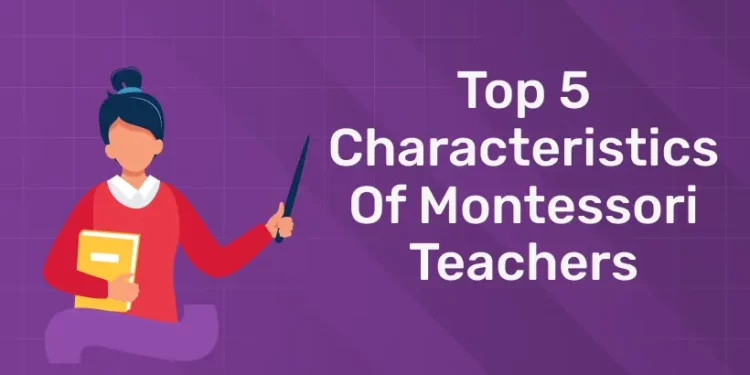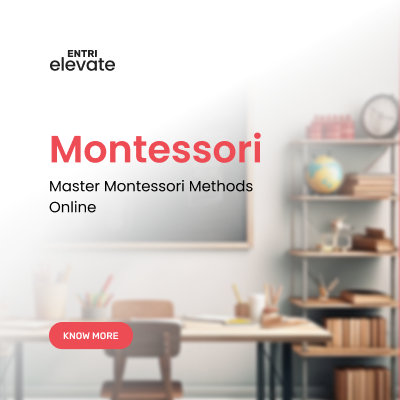Table of Contents
One of the most enthusiastic, committed, and innovative teaching professions are those in the Montessori school. They are always trying to think of fresh approaches to help and encourage their pupils to learn. Teachers that use the Montessori method have a deep understanding of how kids grow and learn. With training in child development and certification in Montessori education, they are committed to supporting kids on their educational path. In this article we are discussing about the top characteristics of montessori teachers.
Start your journey to becoming a certified Montessori teacher! Get free Demo Here!
Top Characteristics Of Montessori Teachers
Provides A Super Model
A Montessori teacher sets a good example for all children by treating them with genuine respect as unique individuals. A child’s insatiable curiosity is their greatest asset, as any Montessori educator knows. A teacher can most successfully guide that curiosity toward worthwhile endeavors by carefully utilizing that power through perceptive observation and sympathetic listening. Children thus come to understand the value of curiosity and how it shapes who they become as adults. They discover that their lecturers are interested in them and have a wealth of interesting and enjoyable knowledge to provide. This is how respect and trust between students develop in a Montessori classroom.
Observance
The idea that kids learn at their own speed is central to the Montessori educational approach. With the appropriate resources, skilled observers can point students in the proper direction. Additionally, they are better able to discern when a youngster is prepared to advance to the next level and master a skill. The ability to closely monitor and guide, as opposed to merely enforcing rules and exercising authority, is a key distinction between a Montessori classroom and a conventional preschool or daycare.
Promotes Creativity
When a child is passionate about something, they don’t require prodding, coaxing, or pressure to find out more. Innovation is propelled forward by creativity. Using keen observation and meticulous record-keeping, Montessori educators create customized lesson plans and objectives for every student in the classroom. These programs assist the kids in reaching new developmental, social, and intellectual benchmarks. A Montessori teacher, however, does not press a student to reach those goals. Rather, he or she makes use of the child’s natural, unbridled creativity and curiosity as the driving force to help the student surpass those benchmarks.
Promotes Initiative, Independence, and Self-Sufficiency
By training instructors to be each child’s mentors on their path to academic success, Montessori education promotes self-reliance in kids from an early age. A Montessori teacher understands when to step back and let the child make mistakes on his own and when to step in and help. A child who picks up the skills necessary to zip, button, and tie a knot via trial and error (and careful supervision) will soon be dressing himself independently and feeling pleased of his accomplishments.
Acquires Knowledge Through Mistakes
The primary idea of the Montessori educational approach is to motivate children to make corrections on their own, under the careful supervision of their teachers, rather than letting mistakes depress them.
It is crucial to assist kids in realizing that mistakes occur and that they can be educational resources. Educators with a Montessori background put their lessons into practice. They can enhance the educational experience for kids by allowing them to learn from their mistakes.
What Makes Montessori Educators Unique?
1: What is the primary focus of the first plane of development in the Montessori method?
The genuine desire and capacity of a child to learn, as well as its acknowledgment of the kid’s need for independence, are what make a Montessori education special. It is believed that for them to advance and enjoy learning, a balanced focus on their intellectual, physical, emotional, and spiritual growth is essential. Youngsters have an inbuilt curiosity and a love of labor and order that, with the right encouragement, can develop into lifetime qualities.
Learning Environment
To understand the essence of Montessori education, all you have to do is walk inside a classroom. Scientifically-designed learning materials are beautifully, aesthetically pleasing, and intelligently arranged. They are ready for use in a purposeful setting. Open floor plans in classrooms foster a discovery-based learning environment that supports the development of students’ faculties of choice. There are places to study independently and in groups; there are no stuffy rows of school tables.
Process Of Learning
A Montessori education gives kids the opportunity to work in multi-age classes, experience “flow,” and hone their focus skills through unbroken work blocks. This teaching approach places a strong emphasis on cultivating attention, self-motivation, personal accountability, and engagement while providing a great deal of opportunity for independence and personal development.
Classrooms With Many Age Groups
Three to six-year-olds make up the entire three-year age grouping in an actual Montessori school. Montessori works so well that separating the five and six-year-olds into a separate kindergarten classroom is a huge squandered opportunity. All of the early practical life and sensory work culminates in an explosion of language and math acquisition during the third “kindergarten year.” Younger students should be exposed to and motivated by the work being done at this stage. Elderly kids should have the chance to assume leadership roles and feel proud of their accomplishments.
Continuous Work Period
Even though this is one of the defining characteristics of the Montessori approach, far too many Montessori schools insert scheduled activities into the morning work period. Make sure the schedule your youngster is on isn’t too busy. A three-hour work time should be held in the morning in a classroom with students ages three to six. A two-hour work session is appropriate for a toddler classroom. Young children find transitions difficult. Extended intervals of unbroken work enable the kid to delve deeply into an activity, explore at their own pace, and improve their concentration skills all of which will prepare them to take on increasingly difficult tasks.
Unlock your passion for education and shape young minds as a Montessori teacher!
CONCLUSION
Being an excellent Montessori teacher takes time. It takes years of schooling, training, research, experience, hard work, devotion, and dedication. One excellent method to get going, head in the right direction, and take the initial step toward success is to enroll in a Montessori teachers training course. The training program is the ideal remedy for them to advance and experience progress and success in their careers.
Frequently Asked Questions
Do Montessori teachers follow a specific curriculum?
The curriculum that Montessori teachers use is founded on the ideas put forth by Maria Montessori and places a strong emphasis on individualized instruction, hands-on learning, and topic integration.
How do Montessori teachers support children with special needs?
Montessori educators personalize their lessons to each child’s specific requirements, making adjustments, accommodations, and extra help as needed to help them feel included and at home.
What are the career prospects for Montessori teachers?
Potential career paths for Montessori educators including employment in Montessori schools, establishing independent Montessori programs, seeking leadership positions in educational institutions, or shifting towards jobs in curriculum development or teacher preparation.
What qualifications do Montessori teachers need?
Montessori teachers usually hold a certification from an accredited Montessori training program, such as the American Montessori Society (AMS) or the Association Montessori Internationale (AMI), though specific credentials may differ based on the school and area.
How do Montessori teachers handle discipline in the classroom?
Positive discipline methods, such as redirection, modeling acceptable behavior, and cultivating a feeling of community and respect among students, are emphasized by Montessori teachers.









![Best software testing projects for resume [ Guide from Experts ]](https://entri.app/blog/wp-content/uploads/2024/05/Best-software-testing-projects-for-resume-Guide-from-Experts--75x75.png)
